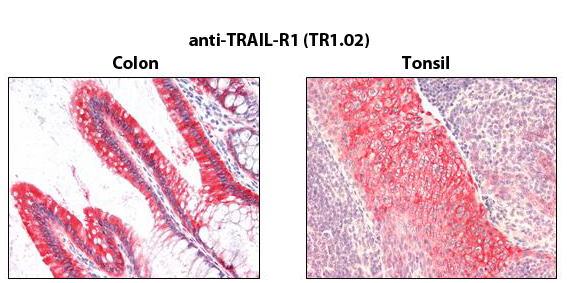anti-TRAIL-R1 (human) mAb (TR1.02)
| Code | Size | Price |
|---|
| AG-20B-0027-C100 | 100 ug | £300.00 |
Quantity:
Prices exclude any Taxes / VAT
Overview
Host Type: Mouse
Antibody Isotype: IgG2b
Antibody Clonality: Monoclonal
Antibody Clone: TR1.02
Regulatory Status: RUO
Target Species: Human
Applications:
- Flow Cytometry
- Immunohistochemistry (IHC)
- Western Blot (WB)
Shipping:
-20°C
Storage:
-20°C
Images
Documents
Further Information
Alternate Names/Synonyms:
TRAIL Receptor 1; DR4; APO2; TNFRSF10A; CD261
Concentration:
1mg/ml
EClass:
32160000
Form (Short):
liquid
Formulation:
Liquid. In PBS containing 10% glycerol and 0.02% sodium azide.
Handling Advice:
After opening, prepare aliquots and store at -20°C.Avoid freeze/thaw cycles.
Immunogen:
Recombinant human TRAIL-R1 (DR4).
Long Description:
Monoclonal Antibody. Recognizes human TRAIL-R1. Does not cross-react with human TRAIL-R2, -R3 or -R4. Isotype: Mouse IgG2b. Clone: TR1.02. Applications: FACS, IHC. Liquid. In PBS containing 10% glycerol and 0.02% sodium azide. TRAIL-R1 is a receptor for the cytotoxic ligand TRAIL. The adapter molecule FADD recruits caspase-8 to the activated receptor. The resulting death-inducing signaling complex (DISC) performs caspase-8 proteolytic activation which initiates the subsequent cascade of caspases (aspartate-specific cysteine proteases) mediating apoptosis. Promotes the activation of NF-kappaB.
NCBI, Uniprot Number:
O00220
Other data:
Specially developed for the immunohistochemical detection of TRAIL-R1 in paraffin embedded tissue. Has been shown to detect TRAIL-R1 expressed at endogenous levels in paraffin-embedded tissue in different mammary carcinoma tissues. For IHC (paraffin sections) TRAIL-R1 specific staining protocol (see PDF on web).
Package Type:
Plastic Vial
Product Description:
TRAIL-R1 is a receptor for the cytotoxic ligand TRAIL. The adapter molecule FADD recruits caspase-8 to the activated receptor. The resulting death-inducing signaling complex (DISC) performs caspase-8 proteolytic activation which initiates the subsequent cascade of caspases (aspartate-specific cysteine proteases) mediating apoptosis. Promotes the activation of NF-kappaB.
Purity:
>95% (SDS-PAGE)
Source / Host:
Purified from concentrated hybridoma tissue culture supernatant.
Specificity:
Recognizes human TRAIL-R1. Does not cross-react with human TRAIL-R2, -R3 or -R4.
Transportation:
Non-hazardous
UNSPSC Category:
Primary Antibodies
UNSPSC Number:
12352203
Use & Stability:
Stable for at least 1 year after receipt when stored at -20°C.
References
TRAIL/bortezomib cotreatment is potentially hepatotoxic but induces cancer-specific apoptosis within a therapeutic window: R. Koschny, et al.; Hepatol. 45, 649 (2007) | Troglitazone-mediated sensitization to TRAILinduced apoptosis is regulated by proteasomedependent degradation of FLIP and ERK1/2- dependent phosphorylation of BAD: K. Grund, et al.; Cancer Biol. Ther. 7, 1982 (2008) | Prognostic significance of tumour necrosis factor-related apoptosis-inducing ligand (TRAIL) receptor expression in patients with breast cancer: T. M. Ganten, et al.; J. Mol. Med. 87, 995 (2009) | Prognostic Value of Tumor Necrosis Factor-Related Apoptosis-Inducing Ligand (TRAIL) and TRAIL Receptors in Renal Cell Cancer: S. Macher-Goeppinger, et al.; Clin. Cancer Res. 15, 650 (2009) | Cytosolic and nuclear caspase-8 have opposite impact on survival after liver resection for hepatocellular carcinoma: R. Koschny, et al.; BMC Cancer 13, 532 (2013) | Cancer cell-autonomous TRAIL-R signaling promotes KRAS-driven cancer progression, invasion, and metastasis: S. von Karstedt, et al.; Cancer Cell 27, 561 (2015) | IAPs cause resistance to TRAIL-dependent apoptosis in follicular 1 thyroid cancer: T.A. Werner, et al.; Endocr. Relat. Cancer 17, 0479 (2018)



